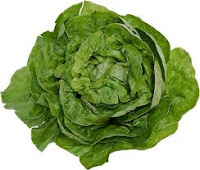LETTUCE, LACTUCA SATIVA, SALAD PATA IN URDU
Lettuce is a common salad ingredient, and the most popular seems to be the iceberg lettuce, which has least nutrients of the lettuces. To get the most health benefits from a lettuce you should choose dark green ones such as the Cos or Romaine lettuce or the oak leaf lettuces. There is the wild lettuce too, Lactuca virosa which has a bitter taste, but which has the most sap which can be used in medicine. The sap has opium-like qualities and is a sedative. It has been used in children’s cough medicines and is traditionally used to calm people who are irascible and of nervous dispositions.
 |
| Cos/Romaine |
In Rome lettuce was regarded as a wonder cure and Augustus Caesar set up an altar for it and set up a statue in honour of it and the physician who prescribed it, as he believed it cured him of a dangerous illness.
Cos lettuce appears to have got its name from the Greek island of Kos which is close to Turkey, and it is generally believed that this type of lettuce was first grown on Kos.
 Egyptians featured lettuce in the wall paintings of pharaohs’ tombs and believed that it was a symbol of male virility, perhaps because when it bolts as it produces seeds; it can reach heights of over 6 feet and looks like a phallus. Egyptians cultivated lettuce for the seeds from which they produced oil, rather than for culinary purposes. On the contrary in Ayurvedic medicine lettuce is used to dampen the libido.
Egyptians featured lettuce in the wall paintings of pharaohs’ tombs and believed that it was a symbol of male virility, perhaps because when it bolts as it produces seeds; it can reach heights of over 6 feet and looks like a phallus. Egyptians cultivated lettuce for the seeds from which they produced oil, rather than for culinary purposes. On the contrary in Ayurvedic medicine lettuce is used to dampen the libido. The Latin name Lactuca means containing milk and is a reference to the milky sap which lettuce produce when cut. This is where the cancer fighting flavonoids are, so you should not cut or tear lettuce leaves to serve them but put them whole in salads.
 The sap is a soothing lotion for skin irritation and sunburn and is a herbal remedy for depression. It contains magnesium, chrome and folic acids and lettuces on the whole are rich in vitamins A, C, K and some B-complex vitamins as well as minerals which include calcium, iron, potassium and manganese. Amino acids and Omega-3 and -6 fatty acids are also present as is the carotenoid zeaxanthin which helps prevent age-related macular degeneration. Like carrots and whinberries lettuces are good for the eyesight. They are members of the Asteraceae or daisy family which includes chamomile, yarrow and sunflowers. Wild lettuce turns its leaves in the direction of the sun as sunflowers turn their heads.
The sap is a soothing lotion for skin irritation and sunburn and is a herbal remedy for depression. It contains magnesium, chrome and folic acids and lettuces on the whole are rich in vitamins A, C, K and some B-complex vitamins as well as minerals which include calcium, iron, potassium and manganese. Amino acids and Omega-3 and -6 fatty acids are also present as is the carotenoid zeaxanthin which helps prevent age-related macular degeneration. Like carrots and whinberries lettuces are good for the eyesight. They are members of the Asteraceae or daisy family which includes chamomile, yarrow and sunflowers. Wild lettuce turns its leaves in the direction of the sun as sunflowers turn their heads. |
| red oak leaf lettuce |
Lettuce has diuretic properties and has been traditionally used to cool the temperature in fevers. It has also been used as a blood purifier and to aid digestion. In Ayurvedic medicine it is prescribed for peptic ulcers as are asparagus, broccoli and alfalfa sprouts.
Gerard the 16th century English herbalist wrote about the sap; “it procures sleep, assuages pain, moves the courses in women and is drunk against the stingings of scorpions and biting spiders.”
Whatever type of lettuce you buy has nutrients in it, but so try the darker ones, as they will do you the most good.
Ingredients
½ head dark green lettuce
225 gr fresh peas
4-6 spring onions, finely chopped
½ handful snipped mint leaves
½ tsp sugar
¼ pint chicken or vegetable stock
1 oz butter
1 tbsp olive oil
Method
Melt the butter with the olive oil then lightly fry the spring onions for 3-4 minutes.
Add the lettuce and swish around the pan until it is wilted.
Add the shelled peas, mint and chicken stock and bring to a boil then simmer until the peas are tender.
Adjust seasoning and serve.
This has Taste and is a Treat.



